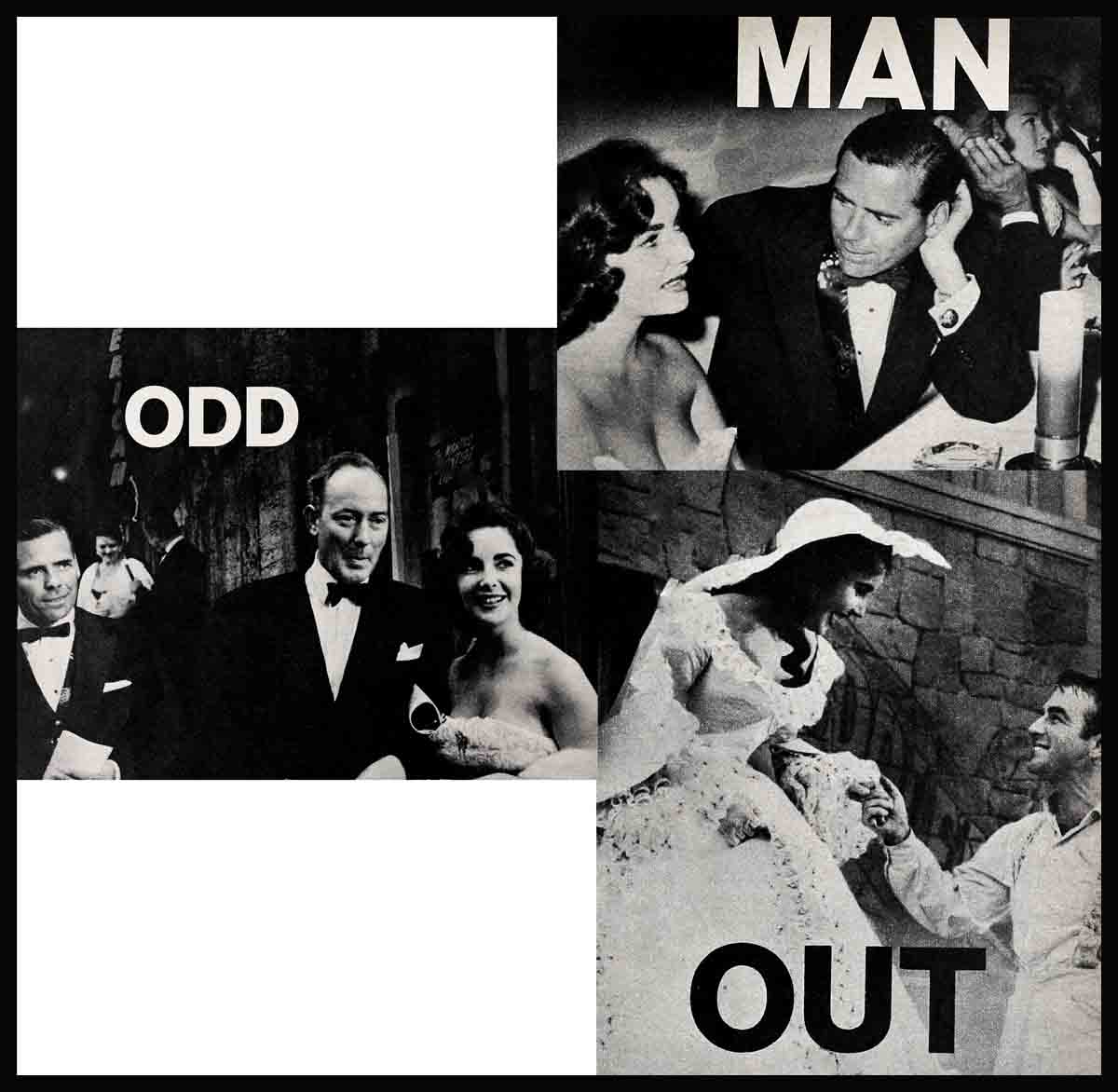
Odd Man Out—Elizabeth Taylor
The electric tingle that sets Hollywood Boulevard vibrating on the night of a big premiere had again caught up in its magic glow the immediate vicinity of the RKO Pantages Theatre.
A hollow roar, punctuated by the high, excited squeals of hundreds of teenagers, went up from the bleachers crowd banked solidly beneath the hot, brilliant lights of the marquee as a long, black limousine pulled up to the curb. It disgorged Michael Wilding first, then radiant Elizabeth Taylor in a sleek, form-fitting evening gown, and finally a handsome, bareheaded young stranger in tuxedo.
They stepped into the roped-off area reserved for celebrities and waited their turn to be interviewed by the TV and radio commentators, putting their heads together for an animated chat while they waited. A buzz went up from the crowd. Who was Liz’s new friend, in whom she was so clearly and obviously interested? Few had ever seen him.
The young stranger was Kevin McClory, an amiable Dubliner in his late twenties who worked as John Huston’s assistant director on “Moby Dick.”
Elizabeth was clearly captivated by the dark-haired Irishman. She talked vivaciously to him while practically ignoring her husband the entire time they were out front.
“What’s the matter with Liz and Mike?” a photographer hissed to me. “I can’t even get them to pose together. They just sort of stand beside each other, but as if they weren’t with each other.”
I shook my head. “Another spat,” I said.
But no one that evening, watching the three of them there together before the microphones, had any idea that just two weeks later Elizabeth would announce her legal separation from Mike—a separation often predicted, but always denied vigorously.
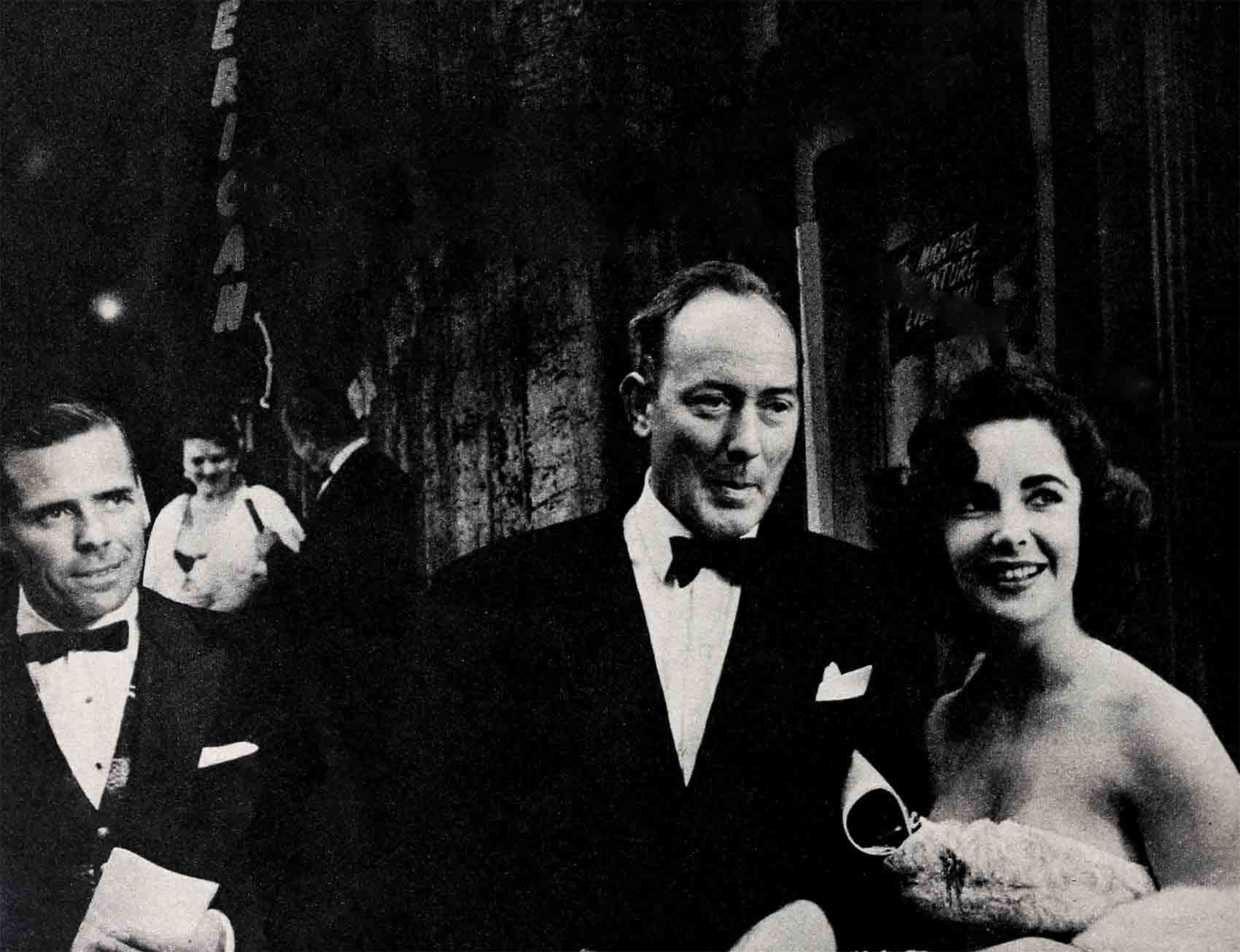
After the “Moby Dick” premiere showing, the celebrities motored on to an after-theatre supper party at the Mocambo. The Gregory Pecks brought director John Huston and Lauren Bacall. (Bogie wasn’t well enough to go out yet.) The gay throng included Diana Dors and her husband, Dennis Hamilton, with Donna Reed and Tony Owen, Lana Turner and Lex Barker, Debbie and Eddie Fisher and many others. Liz and Mike showed up with their young friend, McClory.
The three were shown to a cozy table along the leather-upholstered side wall at the Mocambo. Almost immediately, Mike bounced away to greet friends at the next table. But Liz and Kevin kept their places. They talked a lot to each other that evening as the merry festivities and chatter swirled about them.
But if Mike was table-hopping all over the room, no one gave it any special thought. He’s a friendly, gregarious sort of fellow and there were chums present whom he hadn’t seen in a long time.
And if Liz was overly attentive to the admiring chap by her side, no one made too much out of that, either. After all, it wasn’t the first time she had been to the Mocambo with McClory. A few weeks earlier they had surprised ringsiders when they dropped in one evening for the late show. They had brought along a priest, a friend of McClory’s, as a chaperon. They explained that Mike was working the next day and had to get up early so he didn’t want to come along.
It was almost three before the premiere party broke up and everyone headed for home. Liz and Mike dropped McClory off at his apartment and proceeded to their house on the hill.
No one will ever know what took place between them as they wound quickly through the curving, dark streets of Beverly Hills. No one will know whether Mike, bitterly aware of the difference in age and interests of his stunning young wife and himself, blew up a flirtation into something important because of his own injured feelings.
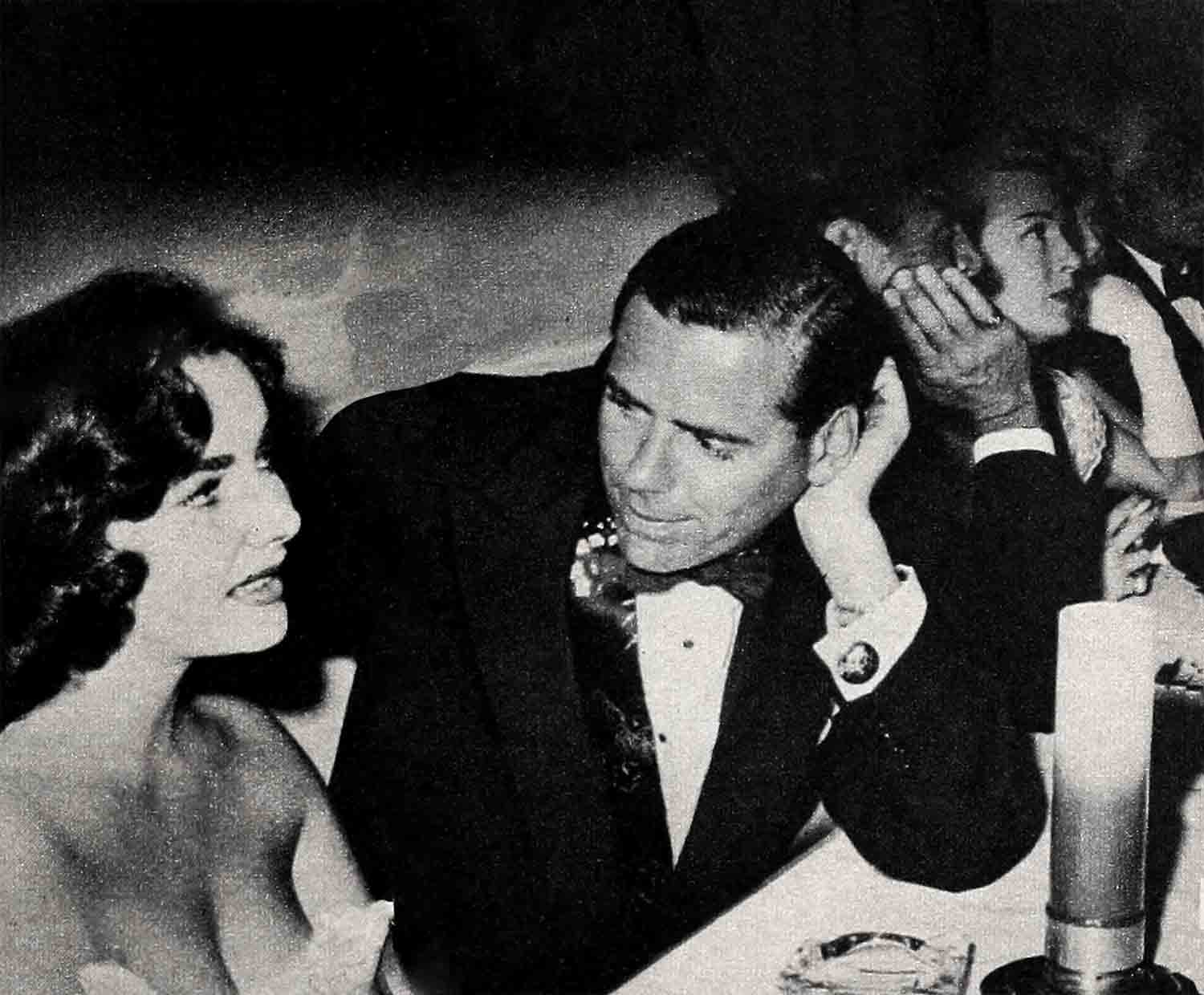
All the outside world knew was the headlines in the morning papers a fortnight later. Elizabeth and Michael, “after careful consideration,” had agreed to an amicable separation on the eve of their separate departures for long movie locations away from Hollywood.
After four years, Liz’s second marriage, the one to the gay, blithe Britisher twenty years her senior, was tottering.
Again, a torrent of speculation blew about Elizabeth Taylor’s beautiful dark head. There had been rumors about the match almost since the day she married Mike. Now the floodgates were opened.
The stories had bubbled up more than a year ago when the “Giant” company was on location on the baking plains of Marfa, Texas. Word reached Hollywood that co-stars Elizabeth Taylor and Rock Hudson were playing their love scenes off as well as on screen.
Liz and Rock stoutly denied these stories, but Mike was sufficiently concerned to fly to Marfa to see what was going on. Elizabeth succeeded in convincing him that it was much ado about nothing. A few days later he returned to Hollywood, to escape the fierce summer Texas heat.
There had also been stories about Liz’s continuing warm, personal friendship with Montgomery Clift. When Monty first returned to Hollywood to make “Raintree County,” he lived with the Wildings at their mutual invitation.
Yet his presence must have posed a problem, even if a subconscious one, for Mike. How would any balding male in his mid-forties with a gorgeous young wife like to have a handsome, personable young man almost half his age, one who worked daily in love scenes with his wife, living under the same roof?
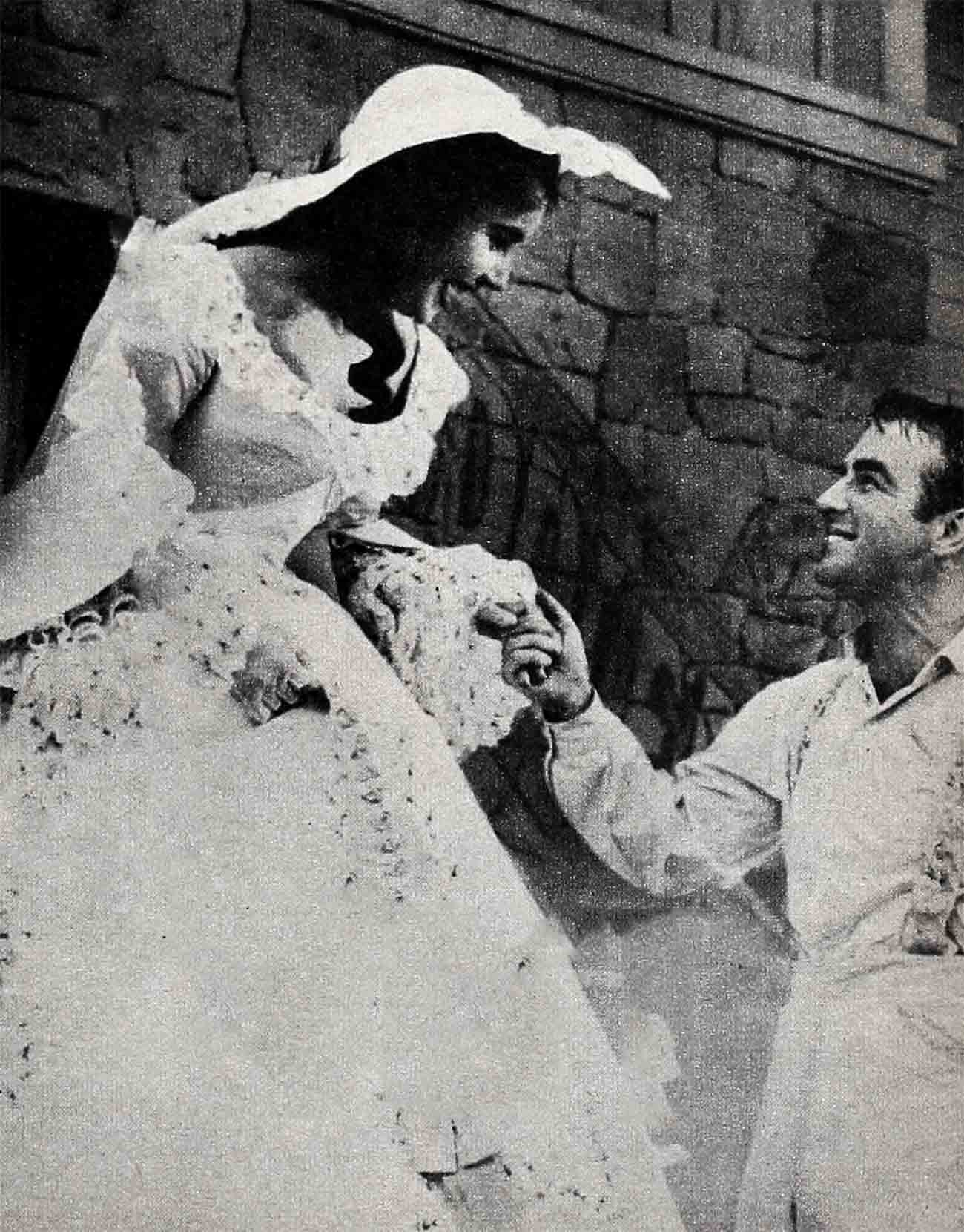
Liz has been fond of Clift ever since she made “A Place in the Sun” with him in 1951. But he never paid much attention to her in those days. She was just a kid and he had his own heart interest of the moment, a woman not in pictures.
The studio asked him to take Liz to the premiere of “A Place in the Sun.” Two days before the opening, Liz called the studio worriedly to say that she hadn’t yet been invited by Clift. They had to remind him to invite her!
For the fancy opening the studio rented him a tux, a publicity man loaned him his own personal studs and cufflinks and gave him five dollars, because Monty was broke that night.
“What shall I do with her afterwards?” Clift asked.
“Take her anywhere you like,” the studio advised him. “Just sign the checks. We’ll pick up the tabs.”
That was the first night that Liz Taylor and Monty Clift ever went out together on a date. Later that year when he met her plane at Idlewild Airport in New York he felt compelled to deny publicly that there was any romance between them.
Whenever the Wildings are in New York they avail themselves of Monty’s apartment at his invitation. They named him as godfather of their second son, Christopher.
Monty had his bad auto accident last summer following a dinner party at Liz and Mike’s. It was a hysterical Liz who tore down the hill after hearing of the crash, crept into the sports car wreckage and cradled Monty’s head in her lap for more than half an hour until the delayed ambulance arrived to take him to the hospital.
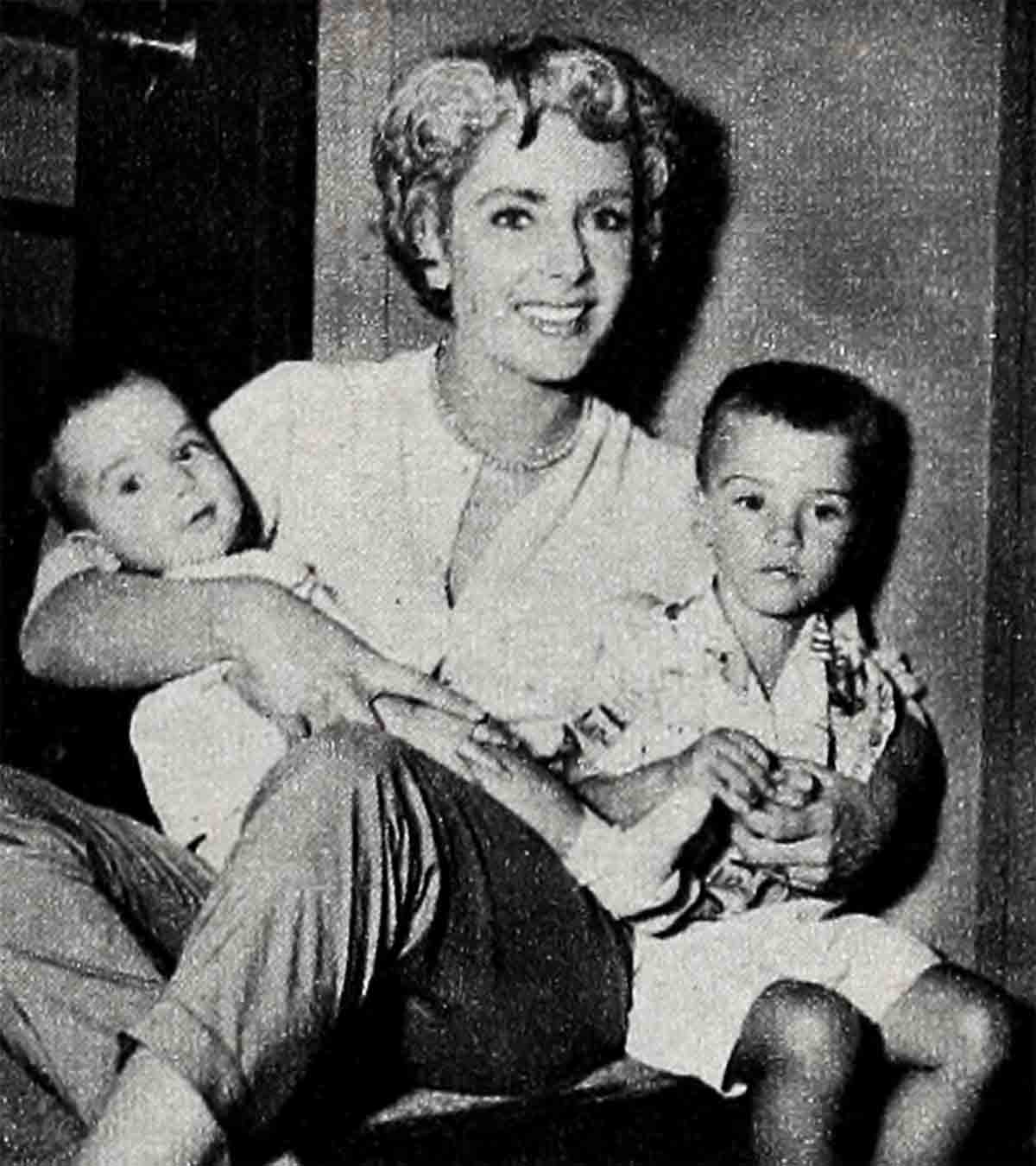
How did Wilding feel on this night? Did he feel that his wife’s anguish was for a platonic friend? Or was he himself so upset by the accident and the injury to his friend that he didn’t notice?
Other rumors have erupted periodically about Liz and Nicky Hilton, ever since their premature, youthful marriage crashed in a breakage of choice illusions after seven tearful months. Many Hollywoodites believe that Liz has never quite gotten over her infatuation for Nicky.
Liz was still dating Nicky intermittently a year after their divorce. Months after she had begun to go with Mike she attended a house party on the Connecticut estate of her uncle, Howard Young, with Nicky as her companion.
Last summer they ran into each other at Santa Anita racetrack one afternoon. They kissed fondly, reminisced about old times, and in general had themselves quite a ball.
But what’s behind the headlines and rumors? Why did Mike Wilding once say, “I liked her better when she turned to me for every decision, when she looked up to me”? He added, “I hate it now. Now I follow her around.”
When did Liz stop looking at Mike as though he were practically a god? And why? What made her decide her marriage was no good? The answer is a complicated one. To unravel it, we must travel back to the days of their first love for one another.
Elizabeth originally met Michael in England when she was only sixteen. She had gone overseas to make “The Conspirators.” It turned out that they were working in the same studio. At that time he was still married to actress Kay Young.
Liz and Mike renewed their friendship on a subsequent trip to London which she made following her divorce from Nicky Hilton. They fell in love with one another, the still naive, wide-eyed beauty and the debonair, good-humored Englishman with the air of having been everywhere and done everything.
Liz became as starry-eyed about her romance with Mike as she had once been about Hilton.
“It doesn’t matter that Michael is forty and I’m nineteen,” she said. “He’s a mere child at heart. We both love each other very much and we are both going to work very hard to make it last. This is no sudden crush.”
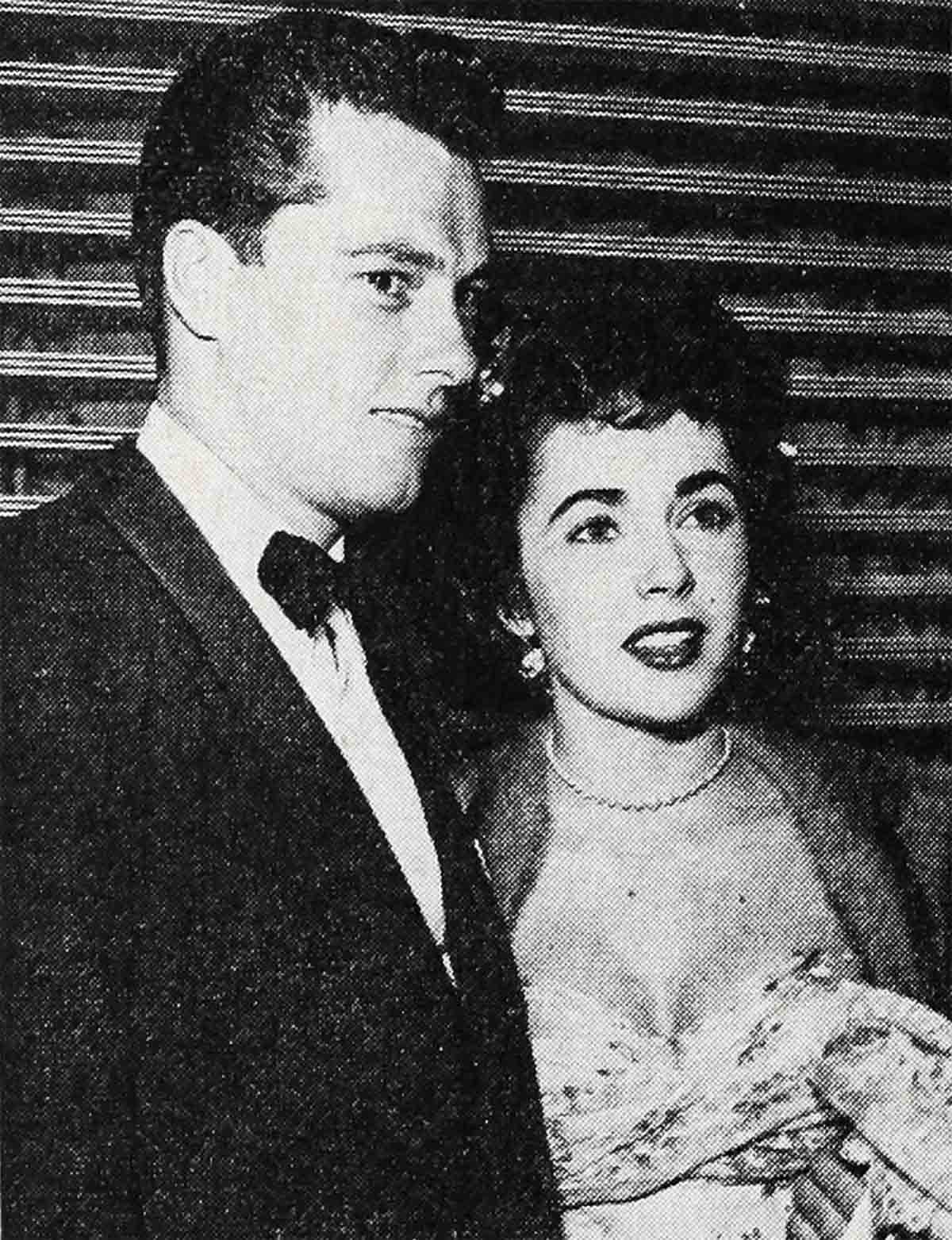
They were married on February 21, 1952, at Caxton Registry Hall in London in the midst of a tumultuous mob scene. Only fourteen people, including his parents, attended the actual ceremony, but once outside they were accosted by hundreds of milling, shouting fans.
In the mad melee which followed, fans scrambled over the hood and top of the wedding limousine. It was all that police could do to get Liz and Mike through the mob and into the car.
After a short honeymoon in the Swiss Alps they returned to Mike’s London flat. For a while it looked as though Liz was never going to return to Hollywood. But eventually they were lured back when M-G-M offered Mike a contract, too.
Liz and Mike always used to deny painstakingly the ever-present rumors about their marriage. Once, on one of their periodic returns from Europe, they found that the gossip mill had been working overtime. Liz was furious. “Where do these rumors originate?” she demanded to know.
Mike urged her to calm down. “We’ll be married long after those silly stories are forgotten,” he told her.
For all his alleged bossiness with Liz before she asserted herself and declared her own private independence day, I for one have felt that Mike was generally kind, gentle and considerate of her.
Liz did not have a normal childhood. She was pampered and waited upon as only a beautiful girl-child can be. She was making movies while still a little girl. She grew up in a studio. Her high schooling was scarcely the average one in its scope and I remember at least one occasion when the serious problem arose of getting her successfully through her examinations.
Mike waited on her, generally at her beck and call. When she was working in “Giant” in Hollywood, she had to be up every morning before five. It was Mike personally who aroused her, because she didn’t like alarm clocks and would have gone back to sleep.
After she was up, he would go out in the kitchen and prepare breakfast, eat with her and see her off to the studio in the cool dawn. He did this for months, although he was not working in a picture himself then and had no personal need to arise so early.
In the first years of their marriage, Mike and Liz never quarreled. They would disagree, but they had no fights. This changed in the past two years as Liz began more and more to assert herself. Her Irish temper would soar when she no longer accepted without a word Mike’s decisions on everything.
In the days when she was on loanout to Paramount for “A Place in the Sun,” Liz made friends with one of the girls in the publicity department. They were so close that they even used to go shopping together. More than once they would go into a department store, Liz would buy a sweater or scarf and then find that she had no money with her.
“Write me a check,” she’d ask her friend. “I’ll pay it back tomorrow.”
One day she took her chum into a swank Beverly Hills auto agency. She was all excited because she planned to surprise her mother with a new Cadillac for her birthday. Of course, she didn’t have with her the money to buy the car.
So she turned to her friend. “Write me out a check for $5500,” she commanded breezily. “I’ll pay you back next week.”
Patiently the pal had to explain that she could cover Liz’s expenditure on a sweater, but not on a new Cadillac.
That was all the idea Liz had about money in those days. But since her marriage she has been learning fast what cash means. She learned the hard way.
When Mike and she returned to Hollywood, she went right to work and he went right to the real-estate offices. Almost before you could say Michael Wilding he had bought them a new mountain-top home for $75,000. The trouble was that it needed so much work to make it livable that another $40,000 or $50,000 had to be added to the cost.
Elizabeth just didn’t have that kind of money. Mike and she went down to the bank and she cashed all her life savings in bonds—some $47,000 worth—to help pay for their house debts.
From then on, Elizabeth Taylor started paying attention to the money spent.
One evening before they announced their separation, Liz, Mike and I enjoyed a leisurely dinner at La Rue. We spent most of our time discussing their marriage.
“I think you have to work at a marriage to make a go of it,” Mike volunteered.
“I don’t like that word ‘work,’ ” Liz objected, in her new-found independence. “Marriage shouldn’t be work. It should be fun and laughter.”
Liz and Mike had a tremendous amount of fun and laughter in the early years of their marriage. Midnight suppers of onion soup and champagne. Playgoing sprees in London and New York. Holiday flings in Las Vegas, Carmel-by-the- Sea and on the Continent.
In recent months there has been more work and less fun, and in Liz’s remark is one of the keys to their rift.
Elizabeth is exuberant and restless. Restless for youth, excitement, fun and partygoing. The sort of things she said she didn’t need when she married home-loving pipe-and-slippers-man Wilding.
Their gradually widening rift was evinced in Liz’s moody, subdued manner. When she did cheer up it was an artificial, forced kind of gaiety. She was not the sparkling, vivacious cut-up of past years.
There was one notable exception to this—at the Texas location of “Giant.” Despite the heat and discomforts she had a rollicking time with Rock Hudson, James Dean and the others of the cast.
Understandably, Liz did not want to discuss the final break. “I don’t want to talk about it,” she said with finality. “It’s too personal.”
But the separation was Elizabeth’s own idea. Neither Mike nor she has fallen entirely out of love with one another. There is still an affection between them for all their differences. Both hesitate to take the serious step of divorce.
Elizabeth suggested a separation as a means of seeing how well they got along without each other, to see how much they miss each other and how much they really care. She also suggested it so that it would be possible for her to be seen in public with another man or men without a scandal being made of it. The same would apply to Mike in any dates he might have with other women in Europe, such as old flame Marlene Dietrich, whom he used to date considerably before Liz.
She may miss Mike more than she thinks, unless some other man, or hard work, or a combination of both, take up all of her time. For she was miserably lonely many times in the past when their work kept Michael and her apart for lengthy periods. She is an affectionate, emotional girl beneath her placid-appearing exterior; she found it difficult in those days, with Mike away.
Last winter, unable to bear the thought of another long separation, she accompanied him to French Morocco where he was on location with Anita Ekberg and Victor Mature for several months of filming of “Zarak.”
The living conditions were dismal, the heat unrelenting and the food abominable, but Liz stuck it out, save for a swift trip home to be with the children at Christmas time. Then she returned to Africa and Mike’s side.
Liz has changed quite noticeably in the past year. She is much more matured in her thinking. She now has a definite mind of her own on family and business matters. Consequently, the arguments have multiplied with Mike, for he was used to being in charge.
“They have had a basic quarrel for about two years,” said one close friend. “When Elizabeth married Wilding four years ago she was just a child. He made all of her decisions—even in the smallest matters. He even taught her to eat snails and oysters, something she’d never done.”
In sharp contrast to their first home was their second one, the $150,000 glass, stone and wood ranchhouse which architect George McClain, a family friend, built with Elizabeth specifically in mind. There is nothing of Mike in it that I have ever been able to discover on my visits, with the exception of a small, book-lined study with a TV set in it.
Even then both Mike and Liz admitted that they had quarreled.
“Who doesn’t?” Liz asked me sharply. “Every couple has their disagreements and arguments. It’s a perfectly normal part of any marriage.”
But minor shortcomings which both were once able to shrug off as just one of those things, have bothered them more of late. Michael has become more and more irritated at Elizabeth’s perpetual lateness for all appointments. She, in turn, finds his phlegmatic calm bothers her.
An exposé magazine article on Paul Brinkman helped trigger Jeanne Crain’s divorce suit against him. But a similar type article about Michael Wilding ruffled Elizabeth scarcely at all. Once Michael gave her the straight of it, she simply dismissed the entire matter. It had nothing to do with their separation.
The Wildings until the last preserved an air of cameraderie which fooled many people. A photographer who spent an afternoon at ‘their home snapping magazine pictures of Liz two days before they announced their separation found them frolicking barefooted around the front yard. They were singing songs from the score of “My Fair Lady” and seemed to have not a care in the world.
Their last goodbye was neither a tearful nor a sentimental occasion. Liz drove Mike to the Los Angeles International Airport in their convertible. She walked into the terminal building with him and they said their casual goodbyes to the clicking of news cameras.
Liz, who was wearing a red sweater and tight-fitting red matador pants, kept her arms folded while pictures were being taken, but Mike dropped a tentative arm around her shoulder and smiled rather sadly down at her.
He was off to Europe for three or four months, to make two pictures. First he flew to Paris, then to the South of France for a reunion with old friends. Later he moved on to Sweden to do a picture called “Long Live the King” with director Preston Sturges.
Later this fall he will be in Vienna to do a picture with Ann Sheridan. Ironically, its title is “Lost Love,” a fitting requiem for his own marriage to Liz.
A day after Mike winged out, Liz, late as usual, breathlessly showed up at the airport. Her airliner, already taxiing out on the ramp, was brought back so that she could get aboard and join the rest of the “Raintree County” company on its way to Danville, Kentucky.
Often friends or intimates of a divorcing or separated couple will express a belief that the pair may get back together again, but little such optimism marks this broken match. The friends of Liz and Mike sadly shake their heads.
“They are two such charming, likable people, and they still have an affection for each other,” they say. “But there is too much to overcome. We’re afraid—terribly afraid—that this is the end of a beautiful love affair.”
THE END
—BY DICK WILLIAMS
SEE: Elizabeth Taylor in “Giant”; Michael Wilding in “Zarak.”
It is a quote. PHOTOPLAY MAGAZINE NOVEMBER 1956




